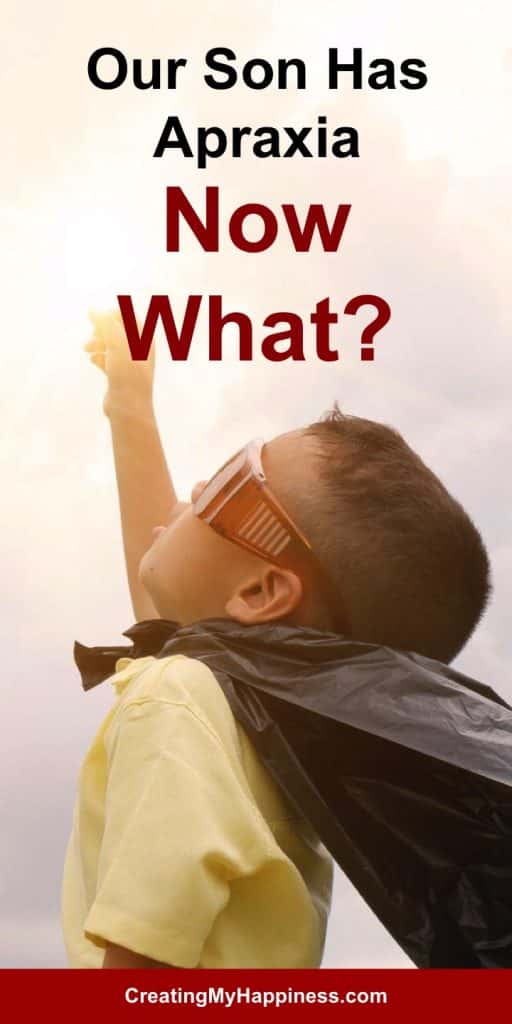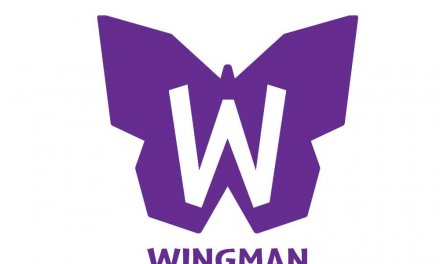 Can you guess what the first thought of a parent who is told their child may never speak? If you’re like us it was “I won’t hear my son say I Love You?” Those who have children without a speech problem will never fully understand those of us who have a child who cannot talk.
Can you guess what the first thought of a parent who is told their child may never speak? If you’re like us it was “I won’t hear my son say I Love You?” Those who have children without a speech problem will never fully understand those of us who have a child who cannot talk.
The point of this post is to shed some light on Apraxia of Speech, what is it, how to get help and to give you hope that your child may some day say those three words you so desperately want to hear.
As any new parent we had no idea what to expect when our son was a baby. We knew he was quiet and his speech wasn’t progressing. Looking back there were signs that we might have not noticed early on. Our son would say “da” or “ma” but never progressed beyond that. I don’t remember him saying any other words or babble like what most babies do. By the time he was age 2 we knew he had some type of speech delay, but did not know to what extent. We immediately started looking for a speech therapist in our area.
Tip – most parents will start their search with their pediatrician. If you do not know where to go or where to start, ask your child’s pediatrician for their recommendation. Most will know of a few speech therapists in the area. Likewise you can always search for speech therapists online, read reviews and see if they have any openings.
We wanted to get our son the help he needed as quickly as we could. We lucked out with finding a speech therapy clinic that had a few openings and since we had a flexible schedule we were able to get seen quickly. Within a few days our son started therapy, going twice a week. These are paid sessions and since we did not have health insurance we would pay out of pocket. From the research I have done, most places will charge between $50-$75 per session with each session being 30 minutes. Most young children need short sessions, otherwise they will get tired or even cranky.
By the time your child is close to age three they can qualify for free speech therapy at your local school. You will need to apply and get started with the school system. Keep in mind that this process can be long and frustrating. Your child may qualify for an IEP (Individualized Education Program). If they have a diagnosis of delayed speech or Apraxia of Speech, then they will get help within the school district. The problem with this – most schools are over loaded and the quality of care might not be as high as you will receive at a private practice. Hear me when I say this.. most who work at your local school will have good intentions but keep in mind that they are most likely overworked, underpaid and given few resources.
When your child is three years old they can then qualify for an IEP. Be sure to talk to your school district 3-6 months before their 3rd birthday as you can usually start the application before their 3rd birthday. We started the application for our son about 6 weeks before his 3rd birthday so by the time he turned three we had the IEP in hand.
Expect Extremely Slow Progress With Apraxia
If your son or daughter has been diagnosed with Apraxia of Speech, you might have researched online to find out what this diagnosis is about.
“Childhood apraxia of speech (CAS) is an uncommon speech disorder in which a child has difficulty making accurate movements when speaking.
In CAS, the brain struggles to develop plans for speech movement. With this disorder, the speech muscles aren’t weak, but they don’t perform normally because the brain has difficulty directing or coordinating the movements.
To speak correctly, your child’s brain has to learn how to make plans that tell his or her speech muscles how to move the lips, jaw and tongue in ways that result in accurate sounds and words spoken with normal speed and rhythm.”
Our son has made huge gains in the last 3 years and everyone who has been with us on this journey will say the same thing. Every day has been a struggle with both speech and acting out. Elijah seems to act out more when he goes through a growth spurt within his speech. During these weeks/months he will be very contrary, say unkind things towards his sisters, be disrespectful with us and has a hard time focusing or sitting still. But it is what happens after these hard times that can be amazing. It is as if his brain is re-wiring and he starts to gain sounds he never had before.
He still calls his sister ‘He He’, but he is getting the /s/ sound more and more as time goes by. Being able to say ‘sissy, sister, snake, snack’ are all very difficult but he’s starting to actually try to make the /s/ sound.
Also during this time he gets more frustrated and feels like he can’t communicate well enough. That is probably the hardest part to watch as he wants to tell us something, whether it was something that happened at school or maybe its something he want. After trying a few times he gives up in frustration. The most important thing for a parent to do during this time is to try your hardest to communicate, to understand and not to blow it off because you don’t know what your child is trying to say.
Our Son Will Speak One Day
Over summer break in 2019 we decided to put Elijah into summer camps and opted out of regular summer school. The summer camps we found in our area were put on by speech therapists who had different themes for each week. During one of the camps we met a little girl who also had Apraxia of Speech and who just turned 6 years old. She was speaking well enough that I don’t think the average person would have noticed she had any type of speech delay. As I was talking with her mother, she mentioned that she saw huge progress “like night and day” as she got closer to her 6th birthday.
What is it about this age? Is it because their brains are maturing and they are starting to understand what their speech therapist is working on with them? We have been told that the journey of Apraxia is long, slow and can be very lonely. Meeting people like this little girl during summer camp gave us hope and encouragement that our son will speak one day. Elijah can ‘talk’, but as I say its easier for us as the parents to understand what he is saying that a stranger.
As he is getting closer to his 6th birthday we are hopeful that he will make huge gains in his overall speech. Knowing that girls tend to advance quicker than boys, we do keep this in mind. Will Elijah make massive changes in the next 4 months? Hopefully but as with Apraxia this is a long term journey.
Other Delays Associated With Apraxia
If your child was diagnosed with Apraxia, be aware that they may have other delays. Delays in motor movements, sensory problems, eating problems, as well a social anxiety, not being able to make friends easily and troubles with their confidence. Our son had motor movement delays. He wasn’t able to jump completely off the ground until he was about 4 years old. Going up and down stairs was non-existent and tripping or falling was an every day thing. Toe walking is also a problem which leads to the tripping/falling.
For this reason your child may need to get into OT (occupational therapy) as well as speech therapy. I know OT sounds funny and might not makes sense but the basics of OT is to help your child overcome difficulties with sensory and/or anxiety issues. For example, does your child toe walk? This can be a sign that they are trying to get more sensory input while they are walking. Does your child toe walk on carpet or hard surfaces? Walking bare foot may help since they will receive more sensory input. Does your child have problems focusing or sitting still? Our son Elijah has a hard time focusing or working on school work. He always has to be moving a part of his body. Even if he is sitting in a chair, he might be swinging his legs wildly.
“People often confuse occupational therapy and physical therapy. Occupational therapy works to improve the life skills or vocational path of their clients/patients. It is a form of rehabilitation that helps people overcome or adapt to their functional deficiencies so they can live as independently as possible. (source)
For example, occupational therapists help:
- Children develop better hand muscle control so they can tie their shoes
- People suffering from anxiety disorders build their social skills”
Where Can You Find Speech Therapists?
I do want to encourage anyone who reads this and thinks that their child has some type of speech delay or speech disorder that they should find help as soon as possible. The earlier you get your child into speech therapy the better the results will be. Many clinics will take insurance, medicaid and many will take self pay only. From what I have seen, the average session will cost between $50-$75. Each session is 30 minutes long. There are grants you can apply for as well as receive help with your local school district. If your child is at least 3 years old, contact your local school district as they are required to provide services. You will have to get an evaluation through the school, who will then give recommendations for help through the school district.
This isn’t the end of my post about Apraxia and our son Elijah, as he will be turning 6 in April 2020. I plan on posting updates as his progress continues.
Elijah currently has 2 sessions per week of speech and 1 session per week of OT in a private practice setting. He is also in Kindergarten and receives speech and OT while at school. We are in the process of pulling him out of public school and will focus on homeschooling him through a local co-opt. Public school can be great for most children and not all schools are rated equal. You might live in an area that has incredible schools. We are blessed to have a good school. The problem is, schools are always underfunded and understaffed. Our son needs much more one-on-one attention, more so than our school can provide him.




